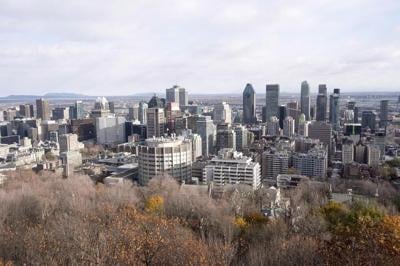Rue de la Montagne is just one of downtown Montreal’s many cool streets, a perfect urban brew of old, new, seedy and trendy. It tells a sociopolitical story, too: once called Mountain Street, it had its signs changed decades ago to reflect the city’s French character.
The problem is, the street — which does indeed run down from Mount Royal — was not named for its topography but for George Mountain, an Anglican bishop who worked tirelessly among Irish emigrants driven to Grosse Île by the Great Famine during the catastrophic summer of 1847.
So much for history. Or at least Anglo-Quebec history.
If I still lived in Montreal, where I was born, I would be considered a “historic Anglo,” and not just because of my relic status. My English would be tolerated, a kindness bestowed. Less historic Anglos could expect no such favours. In official Quebec, Canada’s other official language is simply not welcome, a reality that no longer even raises eyebrows in the province or the rest of the country.
Barely tolerable smidgens of English have become inconvenient remnants of a colonized past. Stop whining, Anglos.
And most Quebec Anglos, accepting that their mother tongue now belongs in the public dustbin, have stopped whining. But listen to the nationalist rhetoric, or look at the policies of the indépendantiste Parti Québécois, which will form the next government if current polling numbers hold. It’s not just English that’s being given the boot; it’s also Anglo-Quebec history.
Which is both tragic and immoral.
No politics can justify erasing a history that boasts: Canada’s oldest brewery (Molson, 1786); Canada’s first bank (Bank of Montreal, 1817); North America’s oldest continually operating shipyard (Davie Shipbuilding, near Quebec City, 1825); Canada’s first art gallery (Montreal Museum of Fine Arts, 1860); and Canada’s first radio station (CFCF, 1922).
Admittedly, much of that legacy was created by wealthy Anglos, the people René Lévesque dismissed as “white Rhodesians.” So also consider contributions of a different kind.
Consider McGill University, which for more than 200 years has been turning out celebrated jurists, politicians, Nobel laureates, astronauts, architects and scientists. Consider the progressive hospitals founded by Anglo-Montrealers, including Dr. Wilder Penfield’s pioneering Montreal Neurological Institute and the Royal Victoria Hospital, where Dr. Norman Bethune developed surgical techniques when he wasn’t out ministering to the city’s poor.
Among writers, appreciate the brilliance of Mavis Gallant, Hugh MacLennan (with his wrenching insight into Quebec’s “Two Solitudes”), Mordecai Richler, Leonard Cohen, Naomi Klein. Group of Seven artist A.Y. Jackson was a Montrealer, as were actors William Shatner and Christopher Plummer. Legendary pianist Oscar Peterson grew up near Rockhead’s Paradise, the famous jazz club that brought such greats as Ella Fitzgerald and Duke Ellington to the city.
If you’re a baseball fan, thank councillor Gerry Snyder for bringing the major leagues to Canada via the Montreal Expos. If you love hockey, know that the first club in Canada was at McGill. If your mouth waters for Montreal smoked meat, visit Schwartz’s on “the Main” (aka Boulevard St-Laurent) and gratefully remember Reuben Schwartz, who opened the iconic deli in 1928.
When you’re browsing at Indigo, think of Heather Reisman, the company’s founder, born and educated in Montreal. When you’re playing Trivial Pursuit, tip your hat to the two Montreal journalists who invented it.
That’s Anglo-Quebec history, which is also personal. I’ve buried family at Notre-Dame-des-Neiges, Canada’s largest cemetery, where the first burial, in 1855, was of an Irish woman. Dr. Penfield operated on my father-in-law, a war veteran. Snyder was a neighbour, his daughter a friend. In the serene beauty of St. Patrick’s Basilica, founded in 1847 by an Irish community that included builders of the Lachine Canal, I’ve sat where D’Arcy McGee, a Father of Confederation, once sat. Like our grandparents before us, my brother and I were each married there. At the annual St. Patrick’s Day parade, the oldest in Canada, my kids regularly froze their tongues on green Popsicles.
Despite their shrinking population, Quebecers who claim English as their first language still total more than a million, not an insignificant number. Not an insignificant community.
For nearly three centuries, Anglo-Quebecers have been a nation-building force for both province and country. When we forget their contributions — consigning remembrance of their strength, passion and vibrant genius to the dustbin like so much linguistic detritus — we betray Canada’s identity and historical conscience.
And we turn Quebec’s history into fiction.
Error! Sorry, there was an error processing your request.
There was a problem with the recaptcha. Please try again.
You may unsubscribe at any time. By signing up, you agree to our and . This site is protected by reCAPTCHA and the Google and apply.
Want more of the latest from us? Sign up for more at our newsletter page.



























To join the conversation set a first and last name in your user profile.
Sign in or register for free to join the Conversation